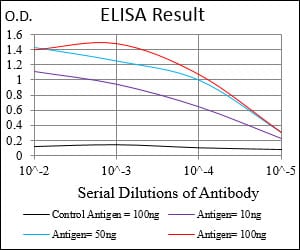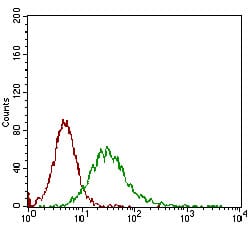

| WB | 咨询技术 | Human,Mouse,Rat |
| IF | 咨询技术 | Human,Mouse,Rat |
| IHC | 咨询技术 | Human,Mouse,Rat |
| ICC | 技术咨询 | Human,Mouse,Rat |
| FCM | 1/200 - 1/400 | Human,Mouse,Rat |
| Elisa | 1/10000 | Human,Mouse,Rat |
| Aliases | GP110; LAMP4; SCARD1 |
| Entrez GeneID | 968 |
| clone | 3F7C6 |
| WB Predicted band size | 37.4kDa |
| Host/Isotype | Mouse IgG1 |
| Antibody Type | Primary antibody |
| Storage | Store at 4°C short term. Aliquot and store at -20°C long term. Avoid freeze/thaw cycles. |
| Species Reactivity | Human |
| Immunogen | Purified recombinant fragment of human CD68 (AA: 42-155) expressed in E. Coli. |
| Formulation | Purified antibody in PBS with 0.05% sodium azide. |
+ +
以下是关于CD68抗体的3篇参考文献示例(内容基于公开学术信息概括,建议通过学术数据库核对原文):
---
1. **文献名称**:*CD68: A Disputed Macrophage Marker*
**作者**:Koopman, R., et al.
**摘要**:探讨CD68作为巨噬细胞特异性标记的争议,指出其也可能表达于其他细胞类型(如树突细胞、成纤维细胞),强调在特定组织环境中需结合其他标记物验证结果。
2. **文献名称**:*Tissue macrophages: How they develop and their roles in disease*
**作者**:Holness, C.L., Simmons, D.L.
**摘要**:研究CD68在正常与病变组织(如动脉粥样硬化斑块)中的表达模式,证实其作为巨噬细胞标志物的可靠性,但提示需注意不同病理状态下的表达差异。
3. **文献名称**:*Immunohistochemical markers of myeloid cells in paraffin sections*
**作者**:Ramos-Vara, J.A.
**摘要**:分析CD68抗体在福尔马林固定组织中的染色效果,比较不同克隆号抗体的特异性,强调抗原修复技术对提高检测敏感性的重要性。
---
**提示**:实际引用时请通过PubMed或Web of Science等平台核实文献信息,确保准确性。如需具体应用案例,可补充研究领域(如肿瘤、炎症等)进一步筛选文献。
CD68 antibody is a widely used tool in immunohistochemistry to identify cells of the monocyte-macrophage lineage. The CD68 protein, encoded by the *CD68* gene in humans, is a transmembrane glycoprotein predominantly localized in lysosomal compartments. It belongs to the lysosome-associated membrane protein (LAMP) family and is highly expressed in tissue-resident macrophages, histiocytes, and myeloid cells. Structurally, CD68 contains a conserved lysosomal targeting motif and scavenger receptor cysteine-rich (SRCR) domains, suggesting roles in phagocytosis, cell-cell interactions, and lysosomal trafficking.
CD68 antibodies (e.g., clones KP1. PG-M1) target specific epitopes on the protein, aiding in macrophage detection in paraffin-embedded or frozen tissues. Its expression is upregulated during monocyte-to-macrophage differentiation, making it valuable for studying inflammatory diseases, tumor-associated macrophages (TAMs), and atherosclerosis. However, CD68 is not entirely macrophage-specific; weak expression occurs in dendritic cells, fibroblasts, and some cancer cells.
While CD68 remains a gold-standard pan-macrophage marker, its utility in distinguishing macrophage subsets (e.g., M1/M2) is limited compared to newer markers like CD163 or CD206. Antibody performance may vary depending on fixation methods, necessitating validation for specific applications. Despite these limitations, CD68 remains indispensable in research and diagnostics for visualizing macrophage distribution and activation in pathological contexts.
×